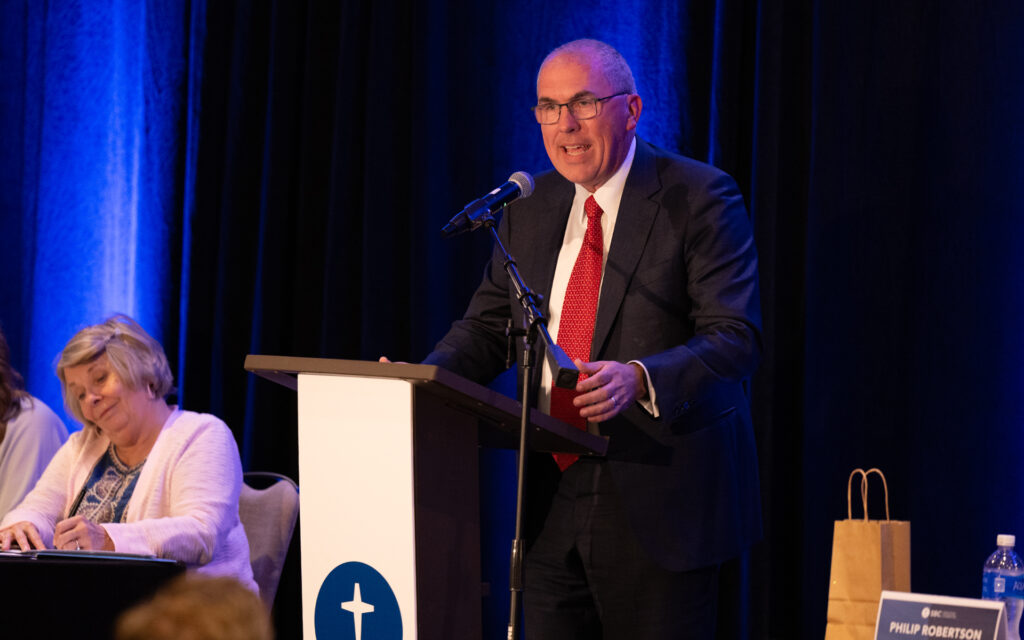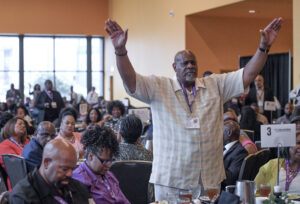
NASHVILLE (BP) – SBC President Bart Barber reminded Executive Committee members that Southern Baptists have been this way before, threatened by “monetary shortfalls, leadership scandals, doctrinal conflict and political humiliation,” but the vision of cooperation that united them prevailed a century ago and can prevail now.
Barber, at the EC meeting in Nashville Monday (Sept. 18), drew on his church history background to recount the state of the Southern Baptist Convention in the 1920s and ‘30s. Their favored political candidate had lost, the culture was moving sharply against them, and in the midst of their most ambitious fundraising campaign, the economy crashed.
“Our economic problems were made worse by the fact that we faced leadership problems in the 1920s and the 1930s,” Barber, pastor of First Baptist Church in Farmersville, Texas, said.
The treasurer of the Foreign Mission Board at the time embezzled half a million dollars “of the money that Southern Baptists had enthusiastically and sacrificially given for the cause of the Great Commission,” Barber said.
Right after that, the Home Mission Board took a hit surrounding its treasurer.
“The mission board had failed to check his background,” Barber said. “If they had, they would have discovered that he was a career criminal. He took nearly a million dollars from the Home Mission Board and absconded with it and fled the country.”
Terrible damage was done “to Convention finances and to Convention confidence in the institutions that were leading us,” Barber said.
Also at the time, Southern Baptists faced substantial internal conflict over doctrine, and Southwestern Baptist Theological Seminary all but closed its doors.
“All across the Southern Baptist Convention, we rightfully wondered whether our institutions, our people and our mission would survive,” Barber said.
Even so, Southern Baptists cannot tell the full story of those decades by recounting only the challenges, he said.
“Amidst all of these controversies, instead of allowing themselves to become embattled and distracted, Southern Baptists chose to be bold and courageous,” Barber said.
“At the very moment when people would be tempted to hunker down and ride out the storm, Southern Baptists gathered in Memphis, Tenn., in 1925 and chose instead to create the Cooperative Program and to adopt the Baptist Faith and Message. They had courage and grit that they put on display.”
More Southern Baptists know about the Cooperative Program and the Baptist Faith and Message than about the scandals of the 1920s and ‘30s because they “represent a clear and compelling statement of a dream for cooperation among Southern Baptist churches,” Barber said.
That vision of cooperation, he said, has survived for nearly a century through broad changes inside and outside the SBC.
“In the moment of our darkest despair, a vision inspired them so much that they remained true to it until the day that they died decades later,” Barber said of earlier Southern Baptists.
“For them, 1925 was the year when, although dozens of reasons to throw in the towel and abandon our one sacred effort were easy to find, we chose instead to search hard for the reasons to lean in and cooperate harder,” he said, “Those reasons may have been fewer, but they were weightier, and we allowed them to lead us.”
A century from now, people may not remember the specific hardships facing Southern Baptists today as much as they will remember whether they came together around a common mission, Barber said.
“Look at the houses our church members live in, the cars that we drive, the number of subscription services that we have to be able to watch whatever we want on TV whenever we want to watch it,” Barber said.
“Compare that to what Southern Baptists owned in the 1920s and 1930s when they stepped up and led us out of trouble. We do not lack money. We do not lack planning. We do not lack opportunity. God help us, what we lack is inspiration.”
Leadership in the SBC does not consist of telling the messengers what they have to do, Barber said. “It consists of inspiring Southern Baptists about what to dream. It consists of putting a vision of cooperation in front of them that will shape their actions and move them forward.
“A dream of cooperation carried us through the 1920s and 1930s, and it will carry us through the 2020s, too.”
Southern Baptists need to “lose interest in those who tear down,” Barber said, referring to social media, and commit their hearts to the Savior who gave His Great Commission.
“If we do that, we need not gather in this place to tremble because God will go before us and give us the victory.”
















